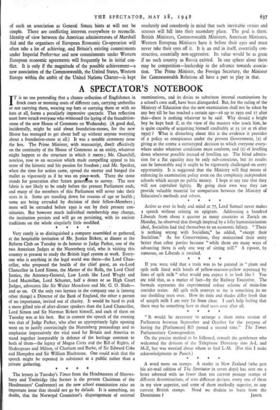The letters in Tuesday's Times from the Headmasters of Shrews-
bury and Tonbridge (the former is the present Chairman of the Headmasters' Conference) on the new school examination raise an important issue that should not go by default. It is something, no doubt, that the Norwood Committee's disparagement of external
examinations, and its desire to substitute internal examinations by a school's own staff, have been disregarded. But, for the ruling of the Ministry of Education that the new examination shall not be taken by any boy till he has reached a certain age-16 up to 1950 and 17 after that—there is nothing whatever to be said. Why should a bright boy be kept back if, in the view of the masters who teach him, he is quite capable of acquitting himself creditably at 15 (or at i6 after 1950) ? What is disturbing about this is the evidence it provides of a policy so conspicuous under the present Government, (i) of giving at the centre a stereotyped decision to which everyone every- where under whatever conditions must conform, and (a) of levelling down wherever possible instead of levelling up. The blind admira- tion for a flat equality may be only sub-conscious, but its results can be lamentable and it ought to be vigorously challenged on every opportunity. It is suggested that the Ministry will find means of enforcing its examination policy even on the completely independent schools which accept no public money. I hope at any rate that they will not capitulate lightly. By going their own way they can provide valuable material for comparison between the Ministry of
Education's methods and others.






























 Previous page
Previous page